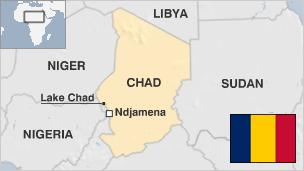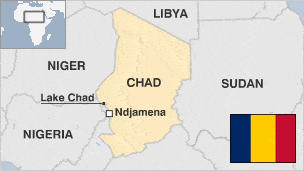-
27 March 2015
- From the section Africa

A largely semi-desert country, Chad is rich in gold and uranium and stands to benefit from its recently-acquired status as an oil-exporting state.
However, Africa’s fifth-largest nation suffers from inadequate infrastructure, and internal conflict. Poverty is rife, and health and social conditions compare unfavourably with those elsewhere in the region.
Chad’s post-independence history has been marked by instability and violence, stemming mostly from tension between the mainly Arab-Muslim north and the predominantly Christian and animist south.
In 1969, Muslim dissatisfaction with the first president, Ngarta Tombalbaye – a Christian southerner – developed into guerrilla war. This, combined with a severe drought, undermined his rule and in 1975 President Tombalbaye was killed in a coup led by another southerner, Felix Malloum.
Mr Malloum failed to end the war, and in 1979 he was replaced by a Libyan-backed northerner, Goukouki Oueddei. But the fighting continued, this time with a former defence minister, Hissen Habre, on the opposite side.
In 1982, with French help, Mr Habre captured the capital, N’Djamena, and Mr Oueddei escaped to the north, where he formed a rival government. The standoff ended in 1990, when Mr Habre was toppled by the Libyan-backed Idriss Deby.
By the mid-1990s the situation had stabilised, and in 1996 Mr Deby was confirmed president in Chad’s first election.
In 1998 an armed insurgency began in the north, led by President Deby’s former defence chief, Youssouf Togoimi. A Libyan-brokered peace deal in 2002 failed to put an end to the fighting.
From 2003 unrest in neighbouring Sudan’s Darfur region spilled across the border, along with hundreds of thousands of Sudanese refugees.
Chad and Sudan accused one another of backing and harbouring rebels, and the dispute led to a four-year break in relations in 2006-2010.
Since late 2013 Chad has played host to tens of thousands of refugees who have fled the fighting in the neighbouring Central African Republic, and in 2015 the country pledged military support to Cameroon in repelling the Islamist Boko Haram insurgency. Boko Haram responded by attacking the Chadian shore of Lake Chad, raising fears that the insurgency might spread east.
Chad became an oil-producing nation in 2003, with the completion of a $4bn pipeline linking its oilfields to terminals on the Atlantic coast. The government has moved to relax a law controlling the use of oil money, which the World Bank had made a condition of its $39m loan.

